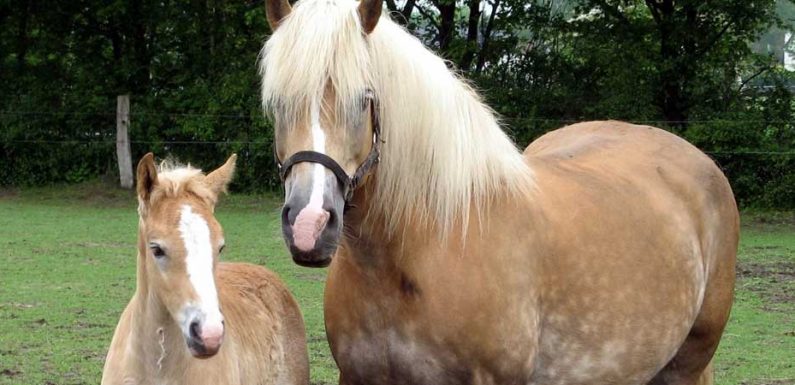
Warmblood fragile foal syndrome (WFFS) is a fatal, inherited connective tissue disorder in horses that shares similarities with the human disorder Ehler-Danlos Syndrome.
WFFS is characterized by abnormally thin, hyperextensible, fragile skin and mucous membranes (tissue that lines cavities and covers organs) resulting in extensive lesions throughout the body. Limb joints are also abnormally flexible. Among documented cases in the literature, affected foals have either died late in gestation, were born live but non-viable, or were euthanized due to poor prognosis for an untreatable condition.
The disorder is caused by a variant (c.2032G > A) in the PLOD1 gene (procollagen-lysine, 2-oxoglutarate 5-dioxygenase 1) . PLOD1 codes for an enzyme important for biosynthesis of collagen, complex molecules that provide strength, stability, and support to many body tissues.
The mutation impairs normal function of the enzyme, which leads to development of the disease. It is inherited as an autosomal recessive disorder.
WFFS was initially identified in warmblood breeds, but recent research at the VGL identified a low allele and carrier frequency of the WFFS variant in Thoroughbreds as well (2.4% carrier frequency in the 716 horses evaluated).
An international team of scientists from Austria, Germany, Poland, and the United States, led by the UC Davis Veterinary Genetics Laboratory Director Dr. Rebecca Bellone, investigated the distribution of the WFFS allele across 38 different horse breeds in Europe and the USA, screening 4081 horses. They also probed the hypothesis that the WFFS allele originated in the Arabian breed. To assess the allele’s prevalence in modern Arabians, they isolated DNA from 302 Arabians from diverse lines. To investigate whether the Arabian stallion Bairactar Or. Ar. (1813) was the founder of the allele, researchers isolated DNA from a museum specimen of his skeletal remains and analyzed it for the WFFS variant.
200 horses (4.9%) representing 21 breeds carried the WFFS allele. Most of these breeds were warmbloods; however, a few non-warmblood breeds also carried the allele. The non-warmblood exceptions include the Thoroughbred (carried by 17 out of 716 horses), the Knabstrupper (3/46), the Haflinger (2/48), and the American Sport Pony (1/12).
The WFFS allele was detected in 17 out of the 19 tested warmblood breeds, with the highest carrier frequency observed in Hanoverians and Danish Warmbloods (both approximately 17.3%). The allele was not detected in two warmblood breeds, the Swedish Warmblood and Zangersheide Warmblood, but sample sizes for both breeds in this study were small (n = 16 and n = 10, respectively). The average WFFS carrier frequency across all warmbloods tested was 11%.
The WFFS allele was not detected in any of the 302 Arabians tested, nor was it detected in the DNA sample isolated from the historical sire Bairactar Or. Ar., suggesting that an Arabian origin of the allele is unlikely. The origin of the WFFS allele remains unknown.
For more on this study see: https://www.mdpi.com/2073-4425/11/12/1518
Source: UC Davis Veterinary Genetics Laboratory
Photo: Haflinger mare and foal by Matthias Walther